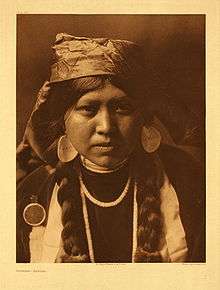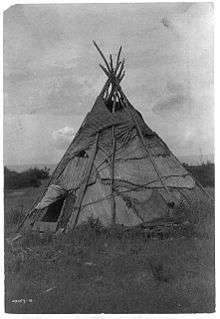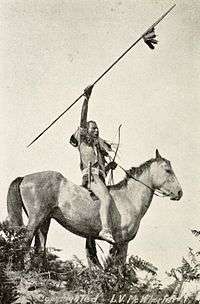Yakama
|
Yakama Warrior ca. 1913, photographed by Lucullus V. McWhorter | |
| Total population | |
|---|---|
| (10,851 (2000 Census)) | |
| Regions with significant populations | |
|
United States ( | |
| Languages | |
| English, Ichishkíin Sínwit | |
| Related ethnic groups | |
| Klickitat Tribe Klickitat |
The Yakama is a Native American tribe with nearly 10,851 members, inhabiting Washington state.
Yakama people today are enrolled in the federally recognized tribe, the Confederated Tribes and Bands of the Yakama Nation. The Yakama Indian Reservation, along the Yakima River, covers an area of approximately 1.2 million acres (5,260 km²). Today the nation is governed by the Yakama Tribal Council, which consists of representatives of 14 tribes.
Many Yakama people engage in ceremonial, subsistence, and commercial fishing for salmon, steelhead, and sturgeon in the Columbia River and its tributaries within land ceded by the tribe to the United States. Their right to fish is protected by treaties and has been re-affirmed in late 20th-century court cases such as United States v. Washington (the Boldt Decision, 1974) and United States v. Oregon (Sohappy v. Smith, 1969).
Etymology
Scholars disagree on the origins of the name Yakama. The Sahaptin words, 'E-yak-ma,' means "a growing family", and iyakima, means "pregnant ones". Other scholars note the word, yákama, which means "black bear," or ya-ki-ná, which means "runaway".[1]
They have also been referred to as the Waptailnsim, "people of the narrow river" and Pa’kiut’lĕma, "people of the gap" which describes the tribe's location along the Yakima River.[1] The Yakama refer to themselves as the Mamachatpam.[1]
History

The Yakama people are similar to the other native inhabitants of the Columbia River Plateau. They were hunters and gatherers well known for trading salmon harvested from annual runs in the Columbia River. In 1805 or 1806, they encountered the Lewis and Clark Expedition at the confluence of the Yakima River and Columbia River.
As a consequence of the Walla Walla Council and the Yakima War of 1855, the tribe was forced to cede much of their land and move onto their present reservation. The Treaty of 1855 identified the 14 confederated tribes and bands of the Yakama, including "Yakama (Lower Yakama or Yakama proper, autonym: Mámachatpam), Palouse (now written Palus, Yakama name: Pelúuspem), Pisquouse (P'squosa, now Wenatchi), Wenatshapam (Yakama name: Winátshapam, now Wenatchi), Klikatat (Yakama name: Xwálxwaypam or L'ataxat), Klinquit (a Yakama subtribe), Kow-was-say-ee (Yakama name: Kkáasu-i or K'kasawi, Tenino subtribe), Li-ay-was (not identified), Skin-pah (Sk'in tribe or Sawpaw, also known as Fall Bridge and Rock Creek people or K'milláma, a Tenino subtribe; perhaps another Yakama name for the Umatilla, which were known as Rock Creek Indians), Wish-ham (Yakama name: Wíshχam, now Wishram, speaking Upper Chinook (Kiksht)),[2] Shyiks (a Yakama subtribe), Ochechotes (Uchi'chol, a Tenino subtribe), Kah-milt-pay (Kahmiltpah, Q’míl-pa or Qamil'lma, perhaps a Klikatat subtribe), and Se-ap-cat (Si'apkat, perhaps a Kittitas (Upper Yakama) subtribe, Kittitas autonym: Pshwánapam or Psch-wan-wap-pams), confederated tribes and bands of Indians, occupying lands hereinafter bounded and described and lying in Washington Territory, who for the purposes of this treaty are to be considered as one nation, under the name 'Yakama'…". (Treaty with the Yakama, 1855) The name was changed from Yakima to Yakama in 1994 to reflect the native pronunciation.
Yakima or Yakama was first a collective term for several small bands speaking the same language or dialect of Shahaptian:
Beside the above listet Yakama bands - the Yakama (Lower Yakama or Yakama proper, autonym: Mámachatpam), Klinquit, Shyiks and Se-ap-cat (Si'apkat, perhaps a Kittitas (Upper Yakama) - there were further historic bands:
- Nahchísh-ħlama (on Nachas River, the largest tributary of the Yakima River)
- Átanŭm-ħlama (on Ahtanum Creek, an right tributary to the Yakima River, entering the Yakima River immediately upstream of Ahtanum Ridge anticline (Union Gap.)
- Písko-ħlama (on Toppenish Creek, an right tributary of the Yakima River)
- Sí-ħlama (on Yakima River above the mouth of Toppenish Creek)
- Síla-ħlama (on Yakima River, between Wenas and Umtanum Creeks)
Language

Yakama is a northwestern dialect of Sahaptin, a Sahaptian language of the Plateau Penutian family. Since the late 20th century, some native speakers have argued to use the traditional Yakama name for this language, Ichishkíin Sínwit. The tribal Cultural Resources program wants to replace the word Sahaptin, which means "stranger in the land".[3]
Notable Yakama people
Notes
- 1 2 3 "Yakama," U*X*L Encyclopedia of Native American Tribes, U*X*L. 2008. Retrieved August 14, 2012 from HighBeam Research: http://www.highbeam.com/doc/1G2-3048800075.html
- ↑ Eugene Hunn: Anthropological Study of Yakama Tribe: Traditional Resource Harvest Sites West of the Crest of the Cascades Mountains in Washington State and below the Cascades of the Columbia River, October 11, 2003
- ↑ Beavert, Virginia and Hargus, Sharon Ichishkíin sínwit yakama = Yakima Sahaptin dictionary. Toppenish, Wash. : Heritage University ; Seattle : in association with the University of Washington Press, 2009; 492 pp. OCLC 268797329
References
- Treaty with the Yakama, 1855, Washington State Governor's Office of Indian Affairs. Accessed 12 Feb 2006.
Further reading
- Ray Hoard Glassley: Indian Wars of the Pacific Northwest,Binfords & Mort, Portland, Oregon 1972 ISBN 0-8323-0014-4
- Helen H. Schuster (1990). The Yakima. Chelsea House. ISBN 1-55546-735-0.
- Donald M. Hines (1992). Ghost Voices: Yakima Indian myths, legend, humor, and hunting stories. Great Eagle Pub. ISBN 0-9629539-2-X.
- A. J. Splawn (1917). Ka-mi-akin, the last hero of the Yakimas. Kilham Stationery & Printing Co.online
- Yakama Nation Background Reading
External links
| Wikimedia Commons has media related to Yakama. |
- Photographs of Yakama from the University of Washington Digital Libraries
- Yakama Nation Cultural Heritage Center
- Online Highway: Yakama Indian Nation
- Columbia River Inter-Tribal Fish Commission, member tribes include the Yakama
- Yakama Nation Wildlife Program
- Yakama Language
- Yakama Nation Fisheries
- Yakima Klickitat Fisheries Project
